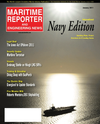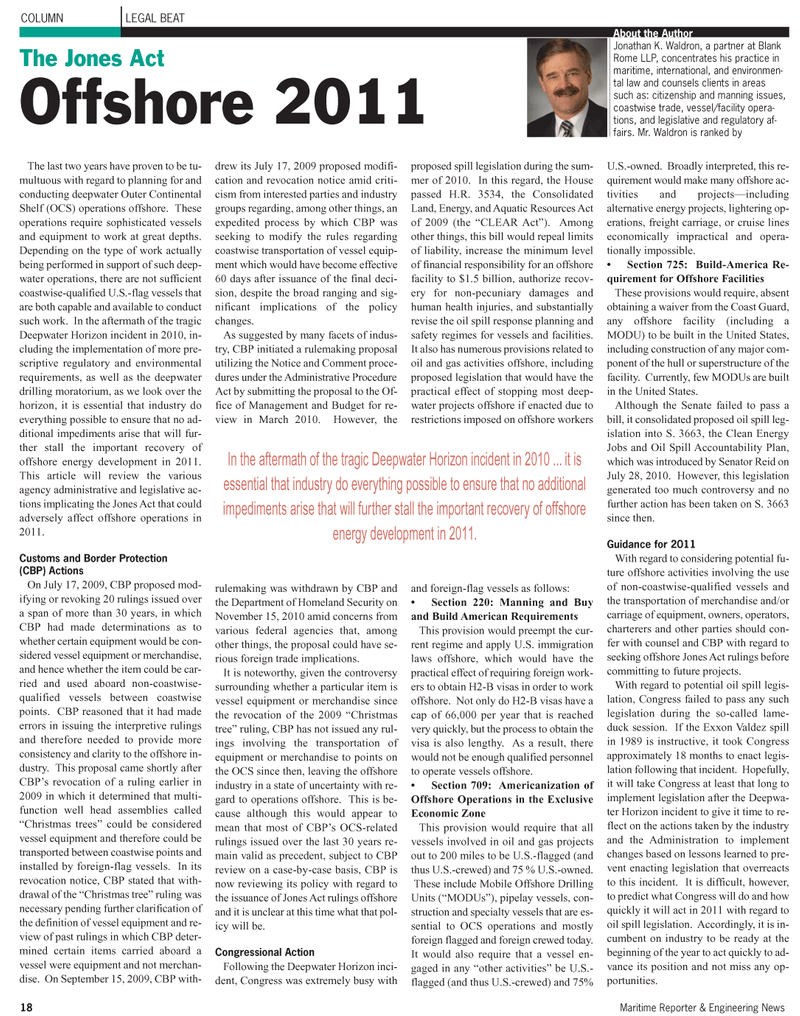
Page 18: of Maritime Reporter Magazine (January 2011)
International Naval Technology
Read this page in Pdf, Flash or Html5 edition of January 2011 Maritime Reporter Magazine
The last two years have proven to be tu- multuous with regard to planning for and conducting deepwater Outer Continental
Shelf (OCS) operations offshore. These operations require sophisticated vessels and equipment to work at great depths.
Depending on the type of work actually being performed in support of such deep- water operations, there are not sufficient coastwise-qualified U.S.-flag vessels that are both capable and available to conduct such work. In the aftermath of the tragic
Deepwater Horizon incident in 2010, in- cluding the implementation of more pre- scriptive regulatory and environmental requirements, as well as the deepwater drilling moratorium, as we look over the horizon, it is essential that industry do everything possible to ensure that no ad- ditional impediments arise that will fur- ther stall the important recovery of offshore energy development in 2011.
This article will review the various agency administrative and legislative ac- tions implicating the Jones Act that could adversely affect offshore operations in 2011.
Customs and Border Protection (CBP) Actions
On July 17, 2009, CBP proposed mod- ifying or revoking 20 rulings issued over a span of more than 30 years, in which
CBP had made determinations as to whether certain equipment would be con- sidered vessel equipment or merchandise, and hence whether the item could be car- ried and used aboard non-coastwise- qualified vessels between coastwise points. CBP reasoned that it had made errors in issuing the interpretive rulings and therefore needed to provide more consistency and clarity to the offshore in- dustry. This proposal came shortly after
CBP’s revocation of a ruling earlier in 2009 in which it determined that multi- function well head assemblies called “Christmas trees” could be considered vessel equipment and therefore could be transported between coastwise points and installed by foreign-flag vessels. In its revocation notice, CBP stated that with- drawal of the “Christmas tree” ruling was necessary pending further clarification of the definition of vessel equipment and re- view of past rulings in which CBP deter- mined certain items carried aboard a vessel were equipment and not merchan- dise. On September 15, 2009, CBP with- drew its July 17, 2009 proposed modifi- cation and revocation notice amid criti- cism from interested parties and industry groups regarding, among other things, an expedited process by which CBP was seeking to modify the rules regarding coastwise transportation of vessel equip- ment which would have become effective 60 days after issuance of the final deci- sion, despite the broad ranging and sig- nificant implications of the policy changes.
As suggested by many facets of indus- try, CBP initiated a rulemaking proposal utilizing the Notice and Comment proce- dures under the Administrative Procedure
Act by submitting the proposal to the Of- fice of Management and Budget for re- view in March 2010. However, the rulemaking was withdrawn by CBP and the Department of Homeland Security on
November 15, 2010 amid concerns from various federal agencies that, among other things, the proposal could have se- rious foreign trade implications.
It is noteworthy, given the controversy surrounding whether a particular item is vessel equipment or merchandise since the revocation of the 2009 “Christmas tree” ruling, CBP has not issued any rul- ings involving the transportation of equipment or merchandise to points on the OCS since then, leaving the offshore industry in a state of uncertainty with re- gard to operations offshore. This is be- cause although this would appear to mean that most of CBP’s OCS-related rulings issued over the last 30 years re- main valid as precedent, subject to CBP review on a case-by-case basis, CBP is now reviewing its policy with regard to the issuance of Jones Act rulings offshore and it is unclear at this time what that pol- icy will be.
Congressional Action
Following the Deepwater Horizon inci- dent, Congress was extremely busy with proposed spill legislation during the sum- mer of 2010. In this regard, the House passed H.R. 3534, the Consolidated
Land, Energy, and Aquatic Resources Act of 2009 (the “CLEAR Act”). Among other things, this bill would repeal limits of liability, increase the minimum level of financial responsibility for an offshore facility to $1.5 billion, authorize recov- ery for non-pecuniary damages and human health injuries, and substantially revise the oil spill response planning and safety regimes for vessels and facilities.
It also has numerous provisions related to oil and gas activities offshore, including proposed legislation that would have the practical effect of stopping most deep- water projects offshore if enacted due to restrictions imposed on offshore workers and foreign-flag vessels as follows: • Section 220: Manning and Buy and Build American Requirements
This provision would preempt the cur- rent regime and apply U.S. immigration laws offshore, which would have the practical effect of requiring foreign work- ers to obtain H2-B visas in order to work offshore. Not only do H2-B visas have a cap of 66,000 per year that is reached very quickly, but the process to obtain the visa is also lengthy. As a result, there would not be enough qualified personnel to operate vessels offshore. • Section 709: Americanization of
Offshore Operations in the Exclusive
Economic Zone
This provision would require that all vessels involved in oil and gas projects out to 200 miles to be U.S.-flagged (and thus U.S.-crewed) and 75 % U.S.-owned.
These include Mobile Offshore Drilling
Units (“MODUs”), pipelay vessels, con- struction and specialty vessels that are es- sential to OCS operations and mostly foreign flagged and foreign crewed today.
It would also require that a vessel en- gaged in any “other activities” be U.S.- flagged (and thus U.S.-crewed) and 75%
U.S.-owned. Broadly interpreted, this re- quirement would make many offshore ac- tivities and projects—including alternative energy projects, lightering op- erations, freight carriage, or cruise lines economically impractical and opera- tionally impossible. • Section 725: Build-America Re- quirement for Offshore Facilities
These provisions would require, absent obtaining a waiver from the Coast Guard, any offshore facility (including a
MODU) to be built in the United States, including construction of any major com- ponent of the hull or superstructure of the facility. Currently, few MODUs are built in the United States.
Although the Senate failed to pass a bill, it consolidated proposed oil spill leg- islation into S. 3663, the Clean Energy
Jobs and Oil Spill Accountability Plan, which was introduced by Senator Reid on
July 28, 2010. However, this legislation generated too much controversy and no further action has been taken on S. 3663 since then.
Guidance for 2011
With regard to considering potential fu- ture offshore activities involving the use of non-coastwise-qualified vessels and the transportation of merchandise and/or carriage of equipment, owners, operators, charterers and other parties should con- fer with counsel and CBP with regard to seeking offshore Jones Act rulings before committing to future projects.
With regard to potential oil spill legis- lation, Congress failed to pass any such legislation during the so-called lame- duck session. If the Exxon Valdez spill in 1989 is instructive, it took Congress approximately 18 months to enact legis- lation following that incident. Hopefully, it will take Congress at least that long to implement legislation after the Deepwa- ter Horizon incident to give it time to re- flect on the actions taken by the industry and the Administration to implement changes based on lessons learned to pre- vent enacting legislation that overreacts to this incident. It is difficult, however, to predict what Congress will do and how quickly it will act in 2011 with regard to oil spill legislation. Accordingly, it is in- cumbent on industry to be ready at the beginning of the year to act quickly to ad- vance its position and not miss any op- portunities. 18 Maritime Reporter & Engineering News
COLUMN LEGAL BEAT
About the Author
Jonathan K. Waldron, a partner at Blank
Rome LLP, concentrates his practice in maritime, international, and environmen- tal law and counsels clients in areas such as: citizenship and manning issues, coastwise trade, vessel/facility opera- tions, and legislative and regulatory af- fairs. Mr. Waldron is ranked by
The Jones Act
Offshore 2011
In the aftermath of the tragic Deepwater Horizon incident in 2010 ... it is essential that industry do everything possible to ensure that no additional impediments arise that will further stall the important recovery of offshore energy development in 2011.

 17
17

 19
19
